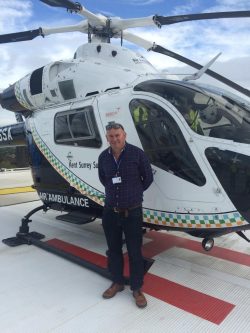Expansion in psychological support at London’s major trauma centres
03 April 2025 - Holistic approach to patient care to ensure physical and psychological needs are met

The NHS in London is improving mental health support for patients with major trauma injuries, their families, local communities and the staff who care for them, with a £4m investment in the capital’s four major trauma centres. This will improve the NHS’s day-to-day resilience and its ability to step-up support in the event of a major incident in the capital – and has already benefited over 5,000 patients (as of December 2024).
The two-year pilot, which is now in its second year and includes a £4 million investment in London’s major trauma centres, is funded by the NHS England London Violence Reduction Programme and led in partnership with NHS England’s specialised commissioning and emergency planning and resilience teams. As reported by the Evening Standard, it involves introducing psychology teams at each of London’s four major trauma centres: King’s College Hospital, Royal London Hospital, St George’s Hospital, and St Mary’s Hospital. The pilot is a collaboration between NHS organisations across London, coordinated by Imperial College Healthcare NHS Trust and West London NHS Trust.
Each centre now has a full team of psychologists in place, covering both child and adults, who are providing direct mental health care to patients, alongside training and support for the wider staff team. This is helping to ensure NHS staff can identify major trauma patients who have psychological support needs early – and provide ongoing specialist support both inside and outside hospital, alongside existing community services.
Prior to launching the pilot, the NHS estimated that it would help around 2,000 patients every year and support the wellbeing of staff working in major trauma. In its first full-year of operation, the pilot supported over 5,000 patients.
Between 30 – 40 per cent of people who undergo major traumatic injury report serious, long-term psychological disorders. This can have a devastating, sometimes lifelong, impact on patients’ lives who may need significant ongoing support from the NHS and local authorities.* Studies have shown that up to 35 per cent of trauma patients are not returning or making an incomplete return to work.** The pilot aims to change this through early identification and prevention, ensuring major trauma patients get the psychological support they need at the right time.
The teams will also allow psychological support to be quickly stepped up in the event of a major incident, such as a natural disaster, significant accident or terrorist attack – and will support patients, their families and staff in major trauma teams, as well as start the coordination of psychological support for the wider community.
The new model of care is based on evidence, including learning from previous major incidents, particularly around the need to proactively screen and treat for symptoms of psychological trauma.
The four major trauma centres are part of a unique network of hospitals, air ambulances and paramedics that provides a safety net for 10 million people in London. It’s known as London’s major trauma system and treats over 12,000 people with the most serious injuries each year.
Dr Malcolm Tunnicliff, Clinical Director for Major Trauma at King’s College Hospital NHS Foundation Trust said, “Until now, we have been able to treat physical injuries resulting from road traffic accidents, falls, penetrating injuries and other major trauma cases, but there has been limited psychological support for those patients. The launch of this service goes a significant way in addressing that, with specialist support to enable holistic recovery.”
* Prevalence of depression and posttraumatic stress disorder after acute orthopaedic trauma: a systematic review and meta-analysis: https://pubmed.ncbi.nlm.nih.gov/27997466/
** A study of outcomes of patients treated at a UK major trauma centre for moderate or severe injuries one to three years after injury: https://pubmed.ncbi.nlm.nih.gov/28929802/
Further information about the London Major Trauma Psychology Network: https://www.england.nhs.uk/london/london-clinical-networks/our-networks/violence-reduction/london-major-trauma-psychology-network/
